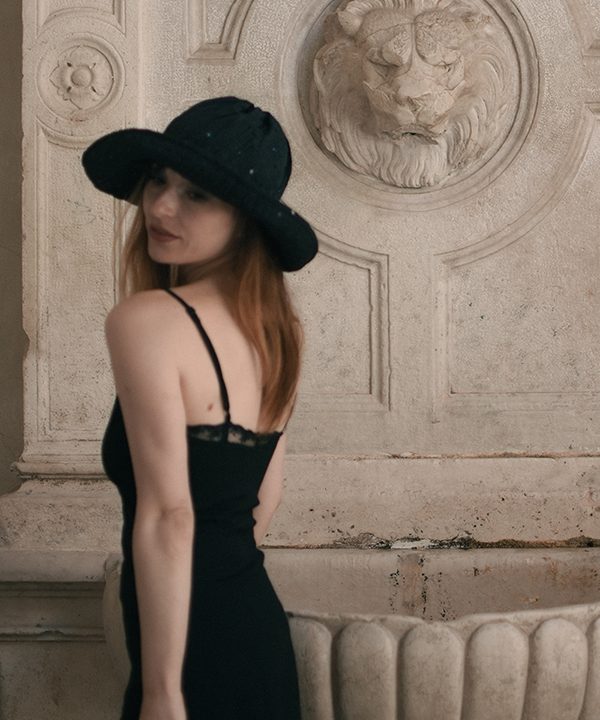
When Life Begins to Read Like a Novel
July 14, 2025
Passing Through the Set
August 13, 2025

The statue whispered the story to the night... of the lovers who slipped past. Of the hearts broken. Of the first kisses. Of the unfolded desires. Of lives lived by darkness. The night belongs to those who dream—and, more precisely, those who live the imagined dreams.
In the quietness of the city streets, when everything seems as peaceful as a graveyard, the lives of the others seem as distant as nonexistent.
The empty corners seem to be held only by us, miles away from the rest of the world. The story is just ours—we are the only two living souls writing this narrative—and the midnight keeps covering up for us, ensuring our secrets remain only ours, as the essential of the existence itself shall belong to those who possess its breath. La luna is the witness of repressed desire, as its cold silver light hides the glitter in lovers’ eyes.
Wandering around nocturnal alleys, we arrived in the empty piazza held only by the statues of the fountain. It is a curious thought, I suppose, how much statues know of the people that share their intimate moments in their presence—moreover, of how much of my own life belonged to them, as they observed the untold. They knew of my ache long before I admitted it; they knew of my true passions before we dared to own them.
As if they were living beings, they seem to keep scents, only to return them back to me as a memory another day. Once I pass by alone, in the daylight, glancing at the place where we stood once—so clearly alive—that the ghosts of us remained there, fading into dreamlike figures.
The instant that held intensity seems to be unclearly placed somewhere between the dream and reality, between imagined and memory. As the night gets older, and the day starts to awaken, the most beautiful instant colours up the empty streets in light shades of blue. The dawn comes like the closing scene. The secrets have been whispered, the moments staged, the narrative written.
Will they remain secretly waiting for us to collect them in the forest of reminiscences? Or will we revive them again?
It is a sentiment on its own—the way the day carries the echo of the night by putting it in the dreamlike part of reality, leaving the protagonists alone wandering: Did they ever live it? Or was the night when they met only a projection of idealistic versions of amour fou, which is but a romanticised paragon of the beautiful madness too attractive not to be thought of, yet too dangerous to give a chance? By looking at the same place, the faded figures of the midnight look distant in their own truth.
In the moment of admitting that it might all be just a dream, the statue is the one to remind—of the vanilla scent I left that night on the shadow of his coat. Yes, it was real. But does it mean it is closer than the dream?
La statua sussurrò la storia alla notte... degli amanti scivolati via. Dei cuori spezzati. Dei primi baci. Dei desideri mai pronunciati. Delle vite consumate nell’ombra. La notte appartiene a chi sogna—e, più precisamente, a chi trasforma l’immaginazione in esistenza.
Nel silenzio delle vie cittadine, quando tutto sembra quieto come un camposanto, le esistenze altrui appaiono remote, quasi inesistenti.
Gli angoli vuoti sembrano custoditi solo da noi, distanti chilometri dal resto del mondo. La trama è solo nostra—siamo le uniche due anime a scrivere questa narrazione—e la mezzanotte continua a proteggerci, affinché i nostri segreti restino tali, poiché l’essenziale dell’essere appartiene a chi ne coglie il respiro più nascosto. La luna osserva i desideri trattenuti, mentre la sua luce d’argento maschera la scintilla negli occhi degli innamorati.
Vagando tra vicoli notturni, siamo giunti in una piazza deserta abitata solo dalle figure scolpite della fontana. È un pensiero curioso, immagino, quanto possano sapere le statue di chi condivide con loro attimi così intimi—e ancor più, quanto della mia vita sia appartenuto a quegli sguardi immobili, testimoni del non detto. Conoscevano i miei tormenti prima che io stessa li ammettessi; avevano già intuito le mie vere pulsioni prima che osassimo reclamarle.
Come fossero presenze animate, sembrano trattenere i profumi—per poi restituirli sotto forma di ricordo, un altro giorno.
Quando passo da sola, alla luce del giorno, gettando lo sguardo sul punto esatto in cui una volta eravamo così vivi, i fantasmi di noi stessi sembrano ancora lì, dissolvendosi in figure oniriche.
L’istante che conteneva tutta l’intensità pare sospeso tra sogno e realtà, tra ciò che fu immaginato e ciò che si è impresso nella memoria.
Con l’avanzare della notte, e il lento risveglio dell’alba, il momento più bello colora le strade deserte in tonalità tenui d’azzurro. Il sorgere del giorno giunge come la scena finale. I segreti sono stati confidati, gli episodi messi in scena, la storia scritta.
Resteranno lì, in attesa che torniamo a raccoglierli nel bosco delle reminiscenze? Oppure saremo noi a ridar loro vita?
È una sensazione a sé—il modo in cui il giorno conserva l’eco della notte, traslandola nella parte più onirica della realtà, lasciando i protagonisti a vagare da soli: È davvero accaduto? O quella notte è stata solo la proiezione di una versione idealizzata dell’amour fou, quel modello romanticizzato di follia bellissima, troppo affascinante per non essere immaginata, troppo pericolosa per essere vissuta davvero?
Rivedendo lo stesso luogo, le sagome sbiadite della mezzanotte sembrano distanti anche nella loro verità.
Nel momento in cui si ammette che forse è stato solo un sogno, è la statua a ricordare—il profumo di vaniglia che lasciai quella sera, posandosi sull’ombra del suo cappotto. Sì, è stato reale. Ma questo lo rende più vicino della fantasia?















